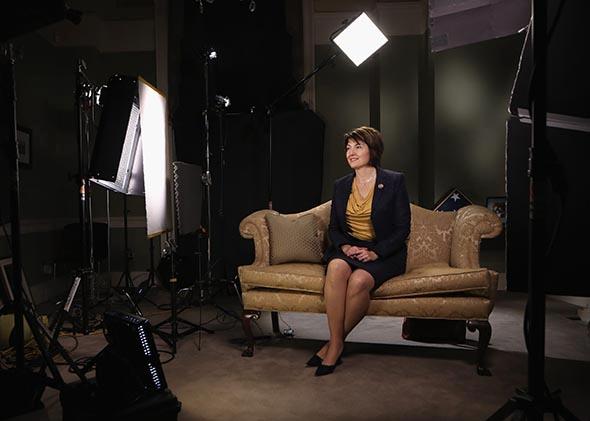Delivering the official State of the Union response speech is one of the hardest jobs in politics. For one thing, you need to prepare your text before you even know what you’re responding to. That’s how you end up with weird occurrences like Rep. Cathy McMorris Rodgers complaining that “the president talks a lot about income inequality, but the real gap we face today is one of opportunity inequality.”
In fact, the president didn’t talk at all about income inequality in his big speech. Instead he talked about “opportunity for all,” “ladders of opportunity,” and the need to “expand opportunity.”
Obama dropped inequality for opportunity for the same reason that Rodgers wanted to criticize him for prioritizing inequality over opportunity: because polls and focus groups say that voters love it when people talk about opportunity. Rodgers laid a trap for the president, but he refused to walk into it. Democrats and Republicans may disagree about just about everything, but they both love equal opportunity. Sidelining it in favor of some other goal is an argument the president just isn’t going to have.
Which is too bad. Because whether focus groups want to hear it or not, the idea of equal opportunities is a toxic blend of the incoherent and undesirable. It makes no sense whatsoever as a social objective.
After all, what would it mean for a society to have equal opportunities?
One form of equal opportunities might be if economic resources were distributed entirely by chance. Everyone’s odds of becoming rich or poor would be equal in the sense that it’s completely random. But a society of randomly distributed unequal outcomes would be perverse. For one thing, it would be terrible for incentives. Why work hard or hone skills if outcomes are going to be randomized anyway? More profoundly, redistributing economic resources away from the undeserving rich and toward the undeserving poor would clearly make the random society better off. A poor person gets more use out of an extra $500 than a rich person would. What’s more, if people knew in advance that economic resources were going to be distributed randomly, they would demand a fairly equal distribution for just this reason (this is one version of philosopher John Rawls’ famous argument for an egalitarian economy).
A more plausible version of equal opportunities is in some sense the opposite. Instead of randomizing outcomes, in which case the winners clearly don’t deserve what they get, here the idea is that winners shouldn’t benefit from unfair advantages. In the real economy, lots of people benefit directly from family connections to help them get a job. This is ubiquitous but also generally viewed as unfair. By the same token, it’s hard to do certain things unless your parents had financial resources when you were a child. A poor kid isn’t going to get to go skiing while growing up, and no matter what her natural level of talent, isn’t going to be an Olympic champion skier as an adult.
So equal opportunities might mean a meritocracy. A society in which the best people succeed. Sort of like what we see in the world of distance running.
Distance running doesn’t require any expensive specialized equipment. To compete at the highest levels, obviously, you need the right shoes. But unlike in skiing there are no barriers to entry. And the upshot of this relentless meritocracy is that the sport is utterly dominated by natives of a handful of East African countries. It turns out that the genetic predispositions for successful long-distance running are much more prevalent in Kenya than in Kansas or Korea.
And as far as that goes, it’s fine. Distance running isn’t that big a deal. But would we want all of society to look like that? After a couple of generations, a true meritocracy would simply be a society in which the adopted children of the elite fare no better on average than anyone else, but their biological children grow up to be elites themselves. Not because of connections or special favors, but because of their inborn talents.
Of course genetics are more complicated than that. Alongside the tendency toward inheritance of parental traits, there’s a lot of randomness. But then we’re simply back to equal opportunities as chance. The concept necessarily veers between opportunity-as-randomness and opportunity-as-hereditary-aristocracy, and neither comes across as particularly appealing.
So whether the focus groups like it or not, an opportunity to climb is no real answer for people at the bottom. A perfectly fair race is, in at least one important way, the same as a rigged race: Both have a first-place finisher and a last-place finisher. The question of what happens to the person at the bottom genuinely matters. Whether you want to phrase that in terms of the gap between the bottom and the top—inequality, as such—or simply look at the absolute condition of the people at the bottom, you can’t escape the conclusion that outcomes matter, and not just in terms of procedural fairness. Today, even poor people are able to take advantage of things like electricity and antibiotics that were rare or nonexistent 100 years ago. That’s the kind of opportunity that matters—the opportunity for everyone to enjoy a better life. But over the past generation, progress has been slow for the nonrich. And over the past 10 years, it’s been essentially absent.
Rodgers wanted to debate whether equality of “opportunity” could make the discussion about inequality irrelevant. The White House denied her the chance, but it’s a debate the country deserves to have. If Obama didn’t give it to us this week, I hope he’ll find the courage to do it some time in the near future.
